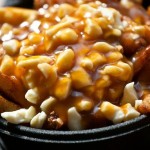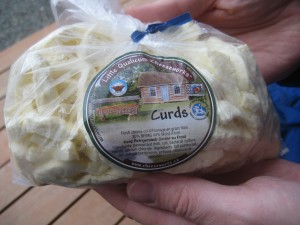Canadians are full of good ideas: bloodless emancipation from Mother England; electric buses; and, perhaps greatest of all, poutine.
For those of you not familiar with this wonder, it’s a fantastic artery-clogging mash-up of French fries, cheese curds and gravy. It’s true that in New York, that great cauldron of dining options, there is poutine to be had. I was introduced to the dish by my friend Ethan at a burger joint in Brooklyn, a mere mile or two from my apartment. (Ethan, I am now realizing, has long served as my food guru, introducing me to all sorts of essentials like Cones gelato in the West Village, the Punjabi cab stand on Houston street and New Haven-style apizza. Combine that with poutine, and I feel that it’s more than anyone can reasonably expect from a single human being.) But in Canada, poutine is more than just a quirky random menu item. It’s omnipresent. It’s a way of life.
 Let’s dwell for a moment on the genius of these ingredients. You’ve got French fries, the most addictive item that the fast food industry has yet been able to create. You’ve got gravy, which, more than a term that for any particular collection of ingredients, is basically just a word for a substance that you put on top of something else to make it taste better. And you have cheese curds, glorious cheese curds, those delectable bits of newborn cheese, so squeaky when bought fresh from Wisconsin supermarkets, so crunchy and salty when deep-fried at the Minnesota state fair. In poutine, they become melting, glisteny globs of fatty heaven. (Jason and I made a special trip to a dairy farm on Vancouver Island so that we could get fresh curd at the exact moment it was released to the public—more on this magical place in coming days.)
Let’s dwell for a moment on the genius of these ingredients. You’ve got French fries, the most addictive item that the fast food industry has yet been able to create. You’ve got gravy, which, more than a term that for any particular collection of ingredients, is basically just a word for a substance that you put on top of something else to make it taste better. And you have cheese curds, glorious cheese curds, those delectable bits of newborn cheese, so squeaky when bought fresh from Wisconsin supermarkets, so crunchy and salty when deep-fried at the Minnesota state fair. In poutine, they become melting, glisteny globs of fatty heaven. (Jason and I made a special trip to a dairy farm on Vancouver Island so that we could get fresh curd at the exact moment it was released to the public—more on this magical place in coming days.)
The origin of the dish is usually traced to Quebec, and the name is almost certainly French, though apparently there is some debate about what it means. Some say that is derived from the English word for pudding, while others maintain that it comes from a French term that means (I’m paraphrasing here) “a big, fat mess.” Continue reading

